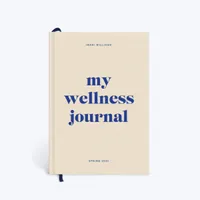
Celebrity news, beauty, fashion advice, and fascinating features, delivered straight to your inbox!
You are now subscribed
Your newsletter sign-up was successful
Affecting 8% of women in the UK, PMDD has the ability to impact your mood, stress levels and emotions - yet is still commonly misdiagnosed
We need to talk about PMDD. With symptoms ranging from teariness to severe fatigue, PMDD can often be conflated with PMS symptoms. But premenstrual Dysphoric Disorder is entirely different to PMS, and can have a life-altering impact on sufferers. Far from being just female hormones acting up in the run up to your TOTM, PMDD can cause extreme mental highs and lows, anxiety and depression. And yet, this common but not so commonly discussed condition is often misdiagnosed.
Such was the case for Chloe Guest, a 28-year-old brand partnerships manager living in London, whose mid-20s were defined by volatile mood swings. "They were so routine, I assumed it was just my personality," she shares.
However, over time, these mood swings intensified, to the point she was regularly experiencing panic attacks, hopelessness, intrusive thoughts, distorted perspective, social anxiety, extreme tearfulness, and anger.
"I had awful self-esteem," she explains. "And although these dark phases would come and go, I became so troubled by how different by personality was day-to-day. I lived in fear of my next ‘phase’, while simultaneously feeling like a fraud for pivoting so rapidly between two extreme emotional states."
So what is PMDD?
Like many other women, it took years of misdiagnoses and frustrating conversations before doctors established that the symptoms Chloe was experiencing were PMDD.
PMDD, or Premenstrual Dysphoric Disorder, is a severe form of mood disturbance which occurs in the run up to a period, according to Dr Deborah Lee of Dr Fox Online Pharmacy. It is currently thought to affect 1 in 20 women in the UK, and can cause extreme anxiety, depression, and mood swings around the time of your monthly bleed. 15% of PMDD sufferers have felt so low, they've attempted suicide.
Celebrity news, beauty, fashion advice, and fascinating features, delivered straight to your inbox!
More needs to be done. Sadly, the condition is still vastly under researched, which means many doctors frequently pass PMDD symptoms off as signs of the better known - but far less debilitating - PMS.
So while things are improving, there's still a lot of confusion - and misdiagnosis. And for women suffering through the highs and lows of PMDD, this must be excruciating.
"PMDD is still often unrecognised, even by doctors," shares doctor Lee. "It was only classified in 2013, meaning many doctors practising today will not have been taught about it at medical school," she shares.
To put it into context, studies on erectile dysfunction outnumber studies on PMDD by five to one. "This is despite the fact 75% of women experience premenstrual symptoms, but only 19% of men suffer from ED," explains doctor Lee. "If only women’s health attracted the same level of interest," she adds.

What causes PMDD?
Sadly, as it's under-researched, it's not yet conclusively known.
"The cause of PMDD haven't been fully determined," doctor Lee explains. Possible causes span alterations in your levels of serotonin, due to the hormonal changes that happen with your menstrual cycle, changes in your levels of brain derived neurotrophic factor (or BDNF) during your monthly cycle, stress, or changes in progesterone concentration during your cycle.
Whats the difference between PMS vs PMDD?
You'll all have heard of PMS, otherwise known as premenstrual syndrome. Stats show that around 75% of women get mild PMS symptoms in the week or so before their period, which can make you feel emotional, irritable and low in mood. "This normally resolves quickly when the period starts," shares doctor Lee.
Think of PMDD as a far more extreme version of PMS: PMDD is much, much more severe.
"PMS sufferers will feel a bit low in mood, but those with PMDD may feel so low they have thoughts of suicide," explains doctor Lee. "PMS sufferers will feel angry; PMDD sufferers will feel their anger so intensely, they feel out of control."
What are the PMDD symptoms?
As with any condition, you may experience one 0r several - every case of PMDD is different, and PMDD will affect everyone differently.
Remember, you don't have to have all of these to be suffering.
- Mood disturbance – irritability, feeling anxious, feeling depressed
- Emotional lability and crying spells
- Problems with concentration
- Memory problems
- Feeling bloated, increased appetite, and gastrointestinal symptoms
- Breast tenderness
- Headaches, and migraines
- Hot flushes
- Dizzy spells
- Fainting
- Sleep difficulties – sleeping too much or too little
- Reduced libido
- Feeling very sensitive
- Feelings or paranoia
- Severe fatigue
- Flare-up of acne or cold sores.
What is the treatment for PMDD?
"Complementary medicines and supplements, such as omega-3 fatty acids, gingko biloba and oil of evening primrose, have shown promising results in the treatment of PMS symptoms," shares doctor Lee.
However she explains that properly designed research trials are needed. Although a few studies have been published on PMDD - in the Curr Psychiatry Rep. and Am J Psychiatry papers, to name a few - more needs to be done.
How can I keep on top of my PMDD symptoms?
If you need help managing PMDD symptoms, your first port of call should be your doctor. But some women find that things like period tracking apps can help them better understand their emotions. Me v PMDD was built specifically to help PMDD sufferers track their symptoms, journal their feelings and find useful resources to help them cope. Pretty neat.
A good old fashioned paper journal can also do the trick. Here are some of our favourites:
Wellness Journal – £24.99 | Papier
The Positive Planner Journal – £20 | Oliver Bonas
CGD LONDON Win At Life Journal – £28 | Selfridges
3 tips for someone who thinks they may have PMDD, from a doctor
1. Get medical help
First thing's first - make an appointment to see a doctor if you're at all worried you may be suffering.
"Ask for the doctor in the practice who has an interest in women’s health, if you can," shares doctor Lee. Also, some doctors may lack experience in dealing with PMDD, so doctor Lee advises taking the 2019 NICE PMS Guidelines with you.
Top tip: try and keep a diary pre seeing a doctor of all of your symptoms and worries. Doctor Lee advises marking the days you are bleeding with a red cross and also indicating when disputes, arguments, or mood swings.
2. Get some support
PMDD can be incredibly lonely, especially as many sufferers find it hard to get the correct diagnosis and level of help.
"Most people don’t understand the problem, and it can have a serious impact on friendships and relationships," the doctor explains.
Top tip: You can access peer only support at the International Society for Premenstrual Disorders, or via Mind’s Side by Side online community. For more information, do read Mind charity's guide to PMDD, too, our helpful guide to self care ideas, while you're here.
3. Stay open minded about treatment options
Remember this: every single woman is different, and so every single cure or remedy will be, too.
Don't fret, though: there are plenty of treatment options available - it's just a matter of working out what works for you. "Listen to the advice given to you by specialised medical professionals - they might recommend antidepressants, the Pill, GnRH inhibitors or other treatment - and try each treatment for three to six months at a time," advises doctor Lee.
Top tip: Persevere - don’t give up too quickly.
Chloe's PMDD story
Chloe has been affected by the condition since her mid 20's, and now advocates for more research to be done into PMDD, and more support to be given to those suffering.
"It took years of misdiagnoses before I was diagnosed with PMDD. I originally thought I might have bipolar disorder. But once I made the connection between my menstrual cycle and my mood, a frantic Google search presented me with PMDD. I felt immediate relief to know there was an actual name for what I had been living with for such a long time. Even then, I had to see a number of doctors before I found someone who had actually heard of PMDD and was willing to take it more seriously than ‘just bad PMS’."
"I’m still on a journey with my PMDD – treatment isn’t a one-size-fits-all, and I’ve experimented with everything from traditional medicine to adaptogens to find what works for me. Reading the latest research, following relevant social accounts and sharing my own experiences has helped me to feel less isolated, whilst tracking, understanding and adapting my routine around my cycle has meant I can lead a more enjoyable life."
"I’m so glad that PMDD is finally getting the coverage it deserves, and I hope more women are able to recognise the symptoms, speak to their GP with confidence and realise it’s not just something they have to put up with as part of being a woman."

Ally is Marie Claire UK's Senior Health and Sustainability Editor, a well-regarded wellness expert, ten-time marathoner, and Boston Qualifying runner.
Utilising her impressive skillset and exceptional quality of writing, she pens investigative, review and first-person pieces that consistently demonstrate flair and originality.
As well as writing, Ally manages a team of freelancers, oversees all commissioning and strategy for her pillars, and spearheads the brand's annual Women in Sport covers, interviewing and shooting the likes of Mary Earps, Millie Bright, and Ilona Maher. Shortlisted for three BSMEs and winning one in 2022, Ally lives and breathes her verticals: her eye for a story and connections within the wellness sphere are unrivalled. Follow Ally on Instagram for more.



